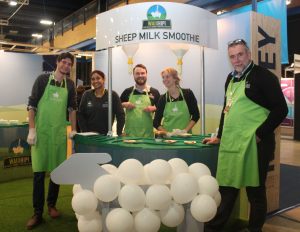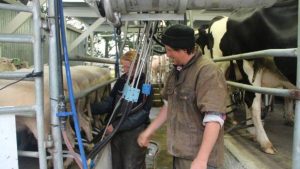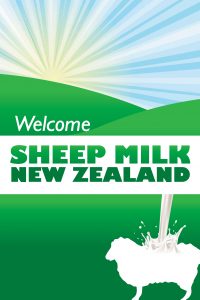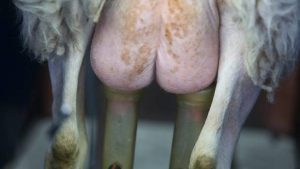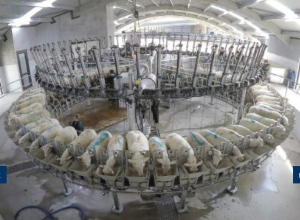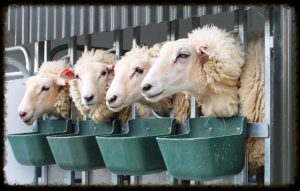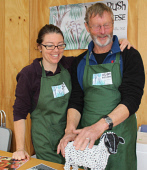Craig Prichard, Massey University
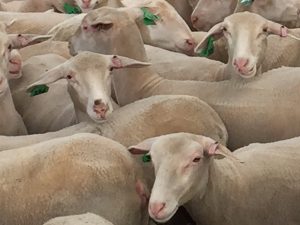
Some of Maui Milk’s first generation Lacaune dairy sheep
It has been a huge fortnight for New Zealand’s fledgling sheep dairy industry. Maui Milk, the Taupo-based Maori-Chinese joint venture, officially opened its new 2000 sheep rotary milking shed and covered barns overlooking Lake Taupo’s western shores, and Waikato Innovation Park announced that it would be building a new $45m milk dryer on its Hamilton site to cope with the growth in sheep milk processing. The new dryer will be part owned by Maui Milk and the region’s other large scale sheep milk firm, Spring Sheep Milk Company.
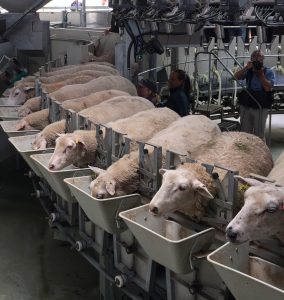
Rotary sheep milk at new Waikino farm.
Both events demonstrate firming confidence and commitment to sheep dairying in the northern end of the country, but inevitably some of those watching such developments from elsewhere might not be quite so impressed or upbeat. Canterbury sheep milk producer and Lincoln academic Guy Trafford is one such observer. In his Interest.co.nz column a week ago he questioned the sense of siting the new dryer in Hamilton and building sheep dairying in the Waikato more generally.
Now Guy Trafford is no armchair critic of sheep dairying nor distant academic observer. He and partner Sue have built a niche sheep milk operation at Charring Cross in Canterbury and in their day job they have worked hard to encourage students to consider Sheep Milking as a new growth industry that address some of the big bovine dairy’s key challenges. But despite this, Guy told his readers that milking sheep in the Waikato was a kind of ‘lunacy’, other regions had more sheep and were more suited to ‘sheep systems’, and that a sheep milk dryer in the Waikato might become a ‘white elephant’. In my view, his claims and conclusions are mostly wrong.
Firstly, Sheep dairying is a milk not a sheep industry. That might seem a semantic difference but strong forces draw sheep dairying to a milk region like the Waikato. The pressure to create higher value milk products from expensive land, the pressure to diversify farm incomes and farm investment portfolios, and the pressure to respond to increasing environmental constraints on bovine dairying, inevitably draw sheep dairying into that region. But add to this, the success of Dairy Goat Cooperative which is now effectively closed to new entrant producers given the limited number of new supplier spots and the cost of shares, the expertise and proven success of the Food Innovation Network’s Waikato plant, as well as the tight connections between Waikato rural professionals and Spring sheep and Maui Milk, and its easy to see how sheep dairying and its major piece of manufacturing plant winds up in this cow dairy heartland. Of course from a distance this might seem bizarre. But up close, milking sheep and making high value nutritional powders from that milk makes a lot of economic, environmental and political sense in the Waikato.
Of course other regions are also looking to produce higher value returns from agricultural land, and are also facing environmental constraints. Canterbury being the exemplar here. And Guy is right to claim that there is inequality of access to sheep milk drying facilities around the country. The Government-owned Food Innovation Network which is designed to take food firms from start up to full production, has just one production scale milk dryer, and its in the Waikato, when perhaps there should be one in each of the network’s four locations.
But the problem is not with the stainless steel. Afterall, NZ has enormous milk drying capacity. Fonterra, for example, has the biggest milk dryer on the planet in Canterbury and lately new and bigger capacity has gone in up and down country. The challenge is not finding stainless steel, but convincing the companies that run such machines that high value consumers are looking for non-bovine milk products. Nowadays any trip to a supermarket here or offshore proves this point. But only in some alternative universe can we imagine NZ’s largest company and owner of much of NZ’s drying capacity, processing anything other than cow milk. Sheep milk processing power however is likely to be found in small, market-focused and local companies that share manufacturing facilities, and in foreign-owned dairy companies.
In Canterbury, Synlait has shown some interest in sheepmilk but currently has other products with greater market potential demanding its processing power. In Southland there is, of course, the Blue River Dairy’s dryer and manufacturing plant. Chinese-owned Blue River has been going spectaularly well. In the last year it increased revenue by over 450 percent and was named in the the top 10 in Deliotte’s 2017 Fast 50 company survey. Up the road at Gore is the new (mostly) Chinese-owned Matara Valley Milk Co factory. This has provision for processing sheep milk and may eventually do so as it ramps up. Further north it has been suggested that one of the other Chinese-owned processing plants might be open to discussions about sheep milk processing. But before such conversations can be had, much more work needs to go into sheep milk product development and market testing.
Last year the Cantebury Development Corporation funded KPMG to produce an analysis of possible markets for the region’s sheep milk. Their report focused on yoghurts and icecream. The key issue was not processing capacity but developing a deep understanding of offshore markets, particularly in the Asian Island economies. Their advice was very straight forward: analyse markets first, test products against consumer engagement, and then build supply and processing capacity. The Canterbury Develpoment Corporation did a nice job. But it can only go so far. In Canterbury, and other regions, someone probably needs to start working with offshore consumers, retailers and importers to develop sheep milk products. In the north, both Spring Sheep and Maui Milk have done some of the hard yards in their target markets and from this they are now confident that they can build supply to meet this demand.
But beyond regional inequalities, Guy also took issue with Spring Sheep Milk Co, one of the two Waikato companies pushing ahead with sheep dairying. Spring Sheep is a 50/50 JV between Government-owned Landcorp and marketing and the private equity firm SLC. In 2016 Spring Sheep secured a $12m Primary Growth Parnertship (PGP) Grant from the Ministry of Primary Industries to support their work and the company’s investors stumped up $18m as part of this.
Under the PGP objectives, Spring Sheep is reguired to develop a ‘sustainable route to market for NZ sheep milk products’. Guy’s claim is that Spring Sheep is out of step with this objective by investing in the dryer, by moving its sheep dairying from the Taupo region to Cambridge, and by opting for a totally indoor, goat milking-type, cut and carry farming system. The problem is that these claims are also mostly wrong. For one thing processing sheep milk is not included in the PGP. In other words, the Government investment is to be spent on market and farm development – not processing.
As for moving from Taupo to Cambridge and opting for a fully indoor goat dairy-like system neither of these claims are correct. Spring Sheep’s 3500 ewe milking operation at Taupo with its double 24-aside milking parlour and two enormous covered feed areas all set on 300 or so hectares of Landcorp’s leased Waireikei Estate will continue producing milk as it has done for the last two seasons. What it is moving, however, is a selection of Spring Sheep’s ewes to the new Cambridge demonstration farm where trial work will continue on developing the most effective hybrid indoor-outdoor farm system.
Initial trials suggest that about half time indoors and half outdoors produces the best results. Spring Sheep business manager Thomas Macdonald told last year’s SheepMilkNZConference that not having sheep indoors 100 percent of time or in the paddock full time gives the best results. Over at Maui Milk, Peter Gatley told last week’s crowd that the barns were a tool for protecting the high value dairy sheep during inclement weather, lambing, Facial Eczema danger periods, and to even out the milking ewe’s access to a consistent, rich and nourishing diet. In short, neither Maui nor Spring Sheep sheep will be indoors fulltime.
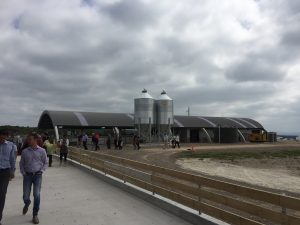
Maui Milk’s milking parlour
It was a sunny but not overly hot day when we watched Maui’s staff milk the company’s 600 late season milkers on its new 64 bail rotary. Afterwards, the ewes happily heading out in the sunshine to a paddock of fresh lucerne. If the weather had been wet, humid or extremely hot, as it had been a few days earlier, they would not doubt have preferred to pass up the grass for the shade of a barn and some silage and nuts. Now, from afar it might look like Maui and Spring sheep are moving indoors. But up close, what they are doing is working out how to used barns to produce the best volume and quality of milk from the available conditions. These are not sheep farmers that is going to wait and hope that its prize workers make it back to the yards after a hard winter on the hill. The barns and mechanical feeding systems are tools that make it possible to even out the ups and downs in weather conditions and feed availabillity in ways that improve animal welfare, work within the strict nutrient loading levels and produce the best quality milk. From afar it probably looks like new sheep milk industry is throwing out the key traditions of NZ sheep industry. But up close this is a evolution in sheep farming that’s taking the best of what’s available, central plateau soils, rainfall and sunshine and reducing the impact of what’s less favourable.
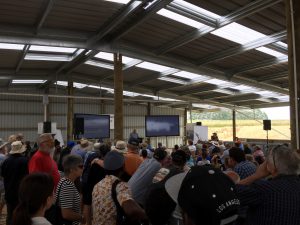
More than 250+ gather for the Waikino Sheep Dairy farm open day.
This piece was published in NZ Farmer on Feb 9. 2018 (click to see published piece).
Craig Prichard is Associate Professor with the School of Management at Massey University. He is co-organizer of the annual SheepMilkNZ Conference to be held in Palmerston North on March 12-13 (please visit: http://sites.massey.ac.nz/sheepmilknz). Through Massey he is involved in multiple market, product and farm projects supporting the development of the sheep milk industry. He also milks a small flock of dairy sheep and is an very amateur sheep cheese, yoghurts and icecream maker.

